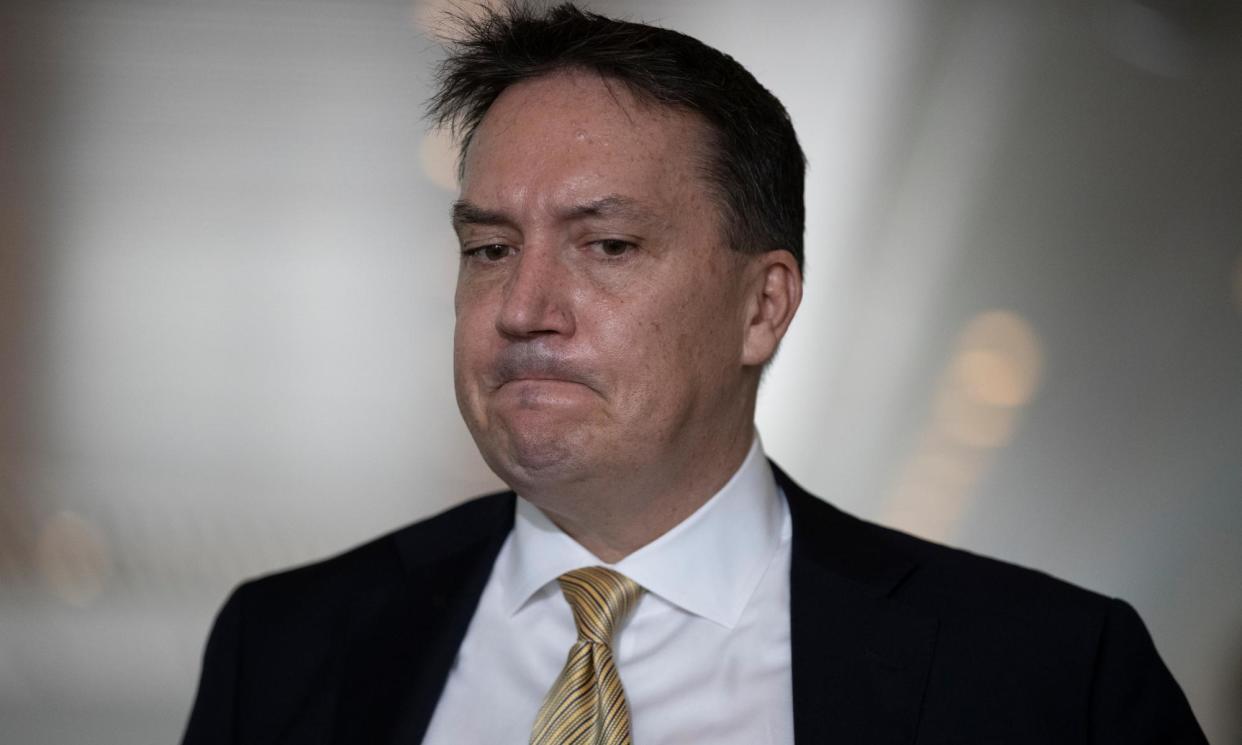The rise of the Libertarians: ‘fringe’ party could win 15 NSW council seats after Liberals’ bungle

The Libertarian party could have up to 15 councillors across New South Wales and take control of a major regional council following the Liberal party’s failure to nominate more than 100 candidates for the weekend’s local government elections.
The NSW Liberal leader, Mark Speakman, said on Sunday his party had “performed strongly” where it had fielded candidates – despite 16 council areas either having no Liberal candidates or fewer than they were meant to.
John Ruddick, NSW’s sole Libertarian MP, attributed some of his party’s success on Saturday to the Liberals’ disastrous administrative bungle, particularly in Camden, Canterbury-Bankstown and Penrith.
Ruddick believes about half of the 32 Libertarian candidates will be elected across NSW including Gregory Harris in Upper Lachlan Shire. Harris was promoted by the controversial anti-lockdown campaigner Monica Smit’s website Fair Dinkum Candidates.
The Libertarians have advocated against drag queen storytime events at libraries and claim Smart Cities, a broad planning concept linked to technological advancements, is about surveilling people and monitoring how much carbon they emit.
Ruddick has said the party looks at every issue through the lens of how to make government smaller and “we’re radically pro-capitalism”.
The minor party had secured nearly 25% of the primary vote in MidCoast by Sunday morning with the NSW electoral commission to resume counting on Monday. Liberals don’t always run there as it is a National party area. The Nationals don’t typically run in council elections and there were no Liberal candidates this year.
Ruddick on Sunday claimed they could win a majority and potentially the mayorship of the large regional council.
“We’d say to property owners, ‘If you put in a development [application] we will approve it. Do whatever you want,’” he said. “No one’s going to be stupid. No one’s going to put an aluminium smelter next to a childcare centre.”
The rightwing minor party ran more candidates across NSW than any other party outside of Labor, Liberal and the Greens, election analyst Ben Raue wrote in Guardian Australia on Sunday. In wards where no Liberal was standing, the Libertarian appeared to have gained most of the Liberal vote.
“On the MidCoast council – which covers regional centres like Forster-Tuncurry and Gloucester – the Libertarian party has won three seats and is the largest grouping on the council,” Raue wrote.
Australian National University politics lecturer Associate Prof Mark Chou last week said political parties – including those opposed to mainstream ideas – were beginning to view local government as more of a “strategic front”.
Chou reviewed the 3,816 candidates running on the weekend and described the Libertarian party – formerly known as the Liberal Democrats – as the “most significant fringe group”.
Raue said Saturday’s election had been bad for the Liberals and mixed for Labor.
“Practically nowhere is good news for the Liberals. We already knew it was going to be a problem because of the nominations,” he said. “They did well in Ryde, they won control of council and the mayorship there. That’s about it.”
Raue said Labor had had “a few really good results and some really bad ones”, including in Canterbury-Bankstown and Cumberland where Labor councillor Mohamad Hussein lost his seat.
Hussein broke ranks with his party earlier this year to vote for the council’s controversial ban – later overturned – on same sex-parenting books at local libraries.
Labor’s primary vote collapsed from 65% to 21% in Hussein’s ward of South Granville, Raue said.
“Part of it was there were more candidates running. Is it the book ban? Probably not. Is it Palestine? Or is it more conservative voters?”
The conservative Our Local Community party achieved a decent result in Cumberland but was wiped out in the neighbouring council area of Parramatta.
Raue said the Greens didn’t do particularly well in the Inner West and had gone backwards in Randwick. He believed this could be partially due to the pro-Israel campaign group Better Council which targeted both inner-city seats.
But the Greens did achieve strong results in some of Sydney’s outer suburbs.
The progressive party was set to have a councillor elected in Cumberland and Blacktown and two in Parramatta and Campbelltown. Campbelltown was one of eight councils with no Liberal candidates due to the party’s administrative error.
Elsewhere, Australia’s longest-serving lord mayor, Clover Moore, secured a record sixth term as the mayor of Sydney.
Asked on Sunday whether she would run again in four years, Moore said: “I don’t think there will be … I’ve just won this one, so let me enjoy it.”


